Food for thoughts
July 11, 2024
Thesaurus : Doctrine
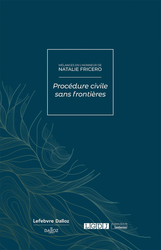
► Référence complète : H. Croze, "Dieu nous garde du contrôle de proportionnalité", in Mélanges en l'honneur de Natalie Fricero. Procédure civile sans frontières, Dalloz et LGDJ, 2024, pp. 179-188
____
► Résumé de l'article :
____
🦉Cet article est accessible en texte intégral pour les personnes inscrites aux enseignements de la Professeure Marie-Anne Frison-Roche
________
July 11, 2024
Thesaurus : Doctrine

► Référence complète : Mélanges en l'honneur de Natalie Fricero. Procédure civile sans frontières, Dalloz et LGDJ, 2024, 704 p.
____
____
📗lire le sommaire de l'ouvrage
____
► Résumé de l'ouvrage (fait par l'éditeur) : "Il est des matières indissociables de certains noms et des noms indissociables de certaines matières. Tel est le lien unissant la Professeure Natalie Fricero et la procédure civile.
Professeure des universités à la Faculté de droit de l’Université de Nice (Côte d’Azur), directrice de l’Institut d’études judiciaires de cette faculté pendant plus de 20 ans, présidente de la première Commission nationale de l’examen d’entrée aux CRFPA, membre du Conseil supérieur de la magistrature entre 2019 et 2022, membre du Conseil national de la médiation depuis 2023, doyenne du pôle civil de l’École nationale de la magistrature, ambassadrice de l’amiable, Natalie Fricero a une carrière immense, voire vertigineuse. Son apport à la doctrine procédurale contemporaine est unanimement reconnu en France et au-delà des frontières nationales par l’ensemble de ses pairs et des professionnels du droit.
Les frontières, la Professeure Natalie Fricero n’a eu de cesse de les repousser, de s’en affranchir, voire de les abolir. Travaillant de concert avec les professions juridiques, la Professeure Natalie Fricero a fait céder la frontière entre le monde universitaire et celui des praticiens. Disruptive, elle a innové dans ses pratiques pédagogiques et œuvre continuellement à une conception moderne de la procédure civile dont elle a très tôt repoussé les limites pour y intégrer les modes amiables de résolution des différends. Pragmatique, elle a considérablement amélioré la lisibilité de la matière tant pour la communauté académique que pour les professionnels à l'échelle nationale et internationale, grâce à ses nombreux ouvrages, articles, conférences, communications, formations et sa participation décisive au code mondial de l'exécution et au code mondial de l'exécution digitale. Précurseur, elle a su saisir en avance l'influx de l’européanisation de la procédure et des droits de l'Homme, mais aussi les opportunités des nouvelles technologies, dessinant les lignes de la procédure civile de demain.
Par sa générosité, son enthousiasme, son dynamisme et son talent, la Professeure Natalie Fricero continue de marquer des générations d’étudiants, d'inspirer nombre de ses collègues et d’influencer la communauté juridique. En lui consacrant ces Mélanges, ses amis souhaitent la remercier de ce qu’elle apporte à chacun et à la procédure civile ; une discipline qu’elle veut humaniste, généreuse, sans frontières ; une procédure civile à son image.".
____
📝lire une présentation de l'article d'Hervé Croze : "Dieu nous garde du contrôle de proportionnalité"
_________
June 28, 2024
Thesaurus : Doctrine
► Référence complète : E. Netter, "Quand la force de conviction du scoring bancaire provoque sa chute. L'interprétation extensive, par la CJUE, de la prohibition des décisions entièrement automatisées", RTD com., 2024, chron., pp.342-348
____
🦉Cet article est accessible en texte intégral pour les personnes inscrites aux enseignements de la Professeure Marie-Anne Frison-Roche
________

June 24, 2024
Organization of scientific events
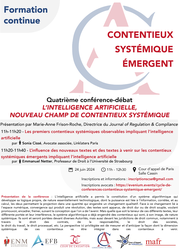
► Full Reference: L’intelligence artificielle, nouveau champ de Contentieux Systémique (Artificial intelligence, new field of Systemic Litigation), in cycle of conferences-debates "Contentieux Systémique Émergent" ("Emerging Systemic Litigation"), organised on the initiative of the Cour d'appel de Paris (Paris Cour of Appeal), with the Cour de cassation (French Court of cassation), the Cour d'appel de Versailles (Versailles Court of Appeal), the École nationale de la magistrature - ENM (French National School for the Judiciary) and the École de formation des barreaux du ressort de la Cour d'appel de Paris - EFB (Paris Bar School), under the scientific direction of Marie-Anne Frison-Roche, June 24, 2024, 11am-12.30pm, Cour d'appel de Paris, Cassin courtroom.
____
🌐see on LinkedIn the report made of this event
____
► Presentation of this conference-debate: Artificial intelligence has enabled the creation of an algorithmic system. This develops its own logic, which is essentially technological in nature. It generates computing power based on the correlation of information to produce possible causalities and build probabilities that are sometimes likened to "predictions", with the mass processed eventually generating a qualitative change.
This change is linked to the digital space itself, which by its very nature gives rise to systemic disputes and litigation, to which the conference-debate on 27 May 2024 was devoted.
There are three ways in which this Emerging Systemic Litigation is involved, and it is important to anticipate these, as the litigation is either in its infancy or still to come, but will undoubtedly arise suddenly.
Firstly, it is possible that the technological tool will make it possible to deal with certain cases where the technical nature of either the concepts or the requests, or the multitude of requests, however simple, require this ability to deal with the mass, which leads to an increase in both the mechanical power of algorithms and the greater presence of human beings, in particular through the increase in adversarial proceedings, pre-trial proceedings, mediation, etc.
Secondly, in the face of this change linked to the digital environment, 'texts' have appeared to 'regulate' the use or the very invention of this or that algorithmic tool, texts of a very diverse nature, from the most soft to the hardest (this gradation between soft and hard law is the theme taken up in the conference-debate of 19 September 2024). These may be measures taken by the firms that produce the tools, those that use them, or those that disseminate them, with the people affected by the information being relatively active. This last point explains why systemic disputes are already underway, concerning the subjective rights that would be violated either by the very nature of artificial intelligence, in this case the rights of content producers, or the rights to privacy, or protection of other Monumental Goals. The systemic and extra-territorial dimension of these disputes has already been established.
The third point is the role of Politics, since the European Union, through the texts currently being adopted, has established that the Goal is not only the sustainability of the technical system, the innovation market and European sovereignty, but also the primacy of people and individuals, through a method that is the Ex Ante ranking of risks. This conception is also contested. This methodological issue also applies to judges.
This Emerging Systemic Litigation is and will be brought before various regulatory or supervisory Authorities, but also before the administrative and judiciary courts, in particular through Contract Law, Tort Law, Company Law, Labour Law, General Procedural Law, etc.
The aim here is to measure and anticipate the way in which the systemic dimension of these disputes will be incorporated into future litigation.
____
🧮Program of this manifestation:
Fourth conference-debate
L’INTELLIGENCE ARTIFICIELLE, NOUVEAU CHAMP DE CONTENTIEUX SYSTÉMIQUE
(ARTIFICIAL INTELLIGENCE, NEW FIELD OF SYSTEMIC LITIGATION)
Paris Court of Appeal, Cassin courtroom
Presentation and moderation by 🕴️Marie-Anne Frison-Roche, Professor of Regulatory & Compliance Law, Director of the Journal of Regulation & Compliance (JoRC)
🕰️11am.-11.10am. 🎤Les deux rencontres entre l'intelligence artificielle et le Contentieux Systémique (The two meetings between Artificial Intelligence and Systemic Litigation), by 🕴️Marie-Anne Frison-Roche, Professor of Regulatory & Compliance Law, Director of the Journal of Regulation & Compliance (JoRC)
🕰️11.10am-11.30am. 🎤Les premiers contentieux systémiques observables impliquant l’intelligence artificielle (The first observable Systemic Litigations involving artificial intelligence), by 🕴️Sonia Cissé, Partner, Linklaters Paris
🕰️11.30am-11.50am. 🎤L’influence des nouveaux textes et des textes à venir sur les contentieux systémiques émergents impliquant l’intelligence artificielle (The influence of new and forthcoming legislation on Emerging Systemic Litigation involving artificial intelligence), by 🕴️Emmanuel Netter, Professor of Law at Strasbourg University
🕰️11.50am-12.30pm. Debate
____
🔴Registrations and information requests can be sent to: inscriptionscse@gmail.com
🔴For the attorneys, registrations have to be sent to the following address: https://evenium.events/cycle-de-conferences-contentieux-systemique-emergent/
⚠️The conference-debates are held in person only, in the Cour d’appel de Paris (Paris Court of Appeal).
____
🧮Read below the report made of this event by Marie-Anne Frison-Roche⤵️
June 20, 2024
Thesaurus : Doctrine
► Référence complète : V.-O. Dervieux, "Israël à Eurosatory : la justice éparpillée « façon puzzle » ?", Actu-Juridique.fr, 20 juin 2024.
____
June 19, 2024
Thesaurus : 02. Cour de cassation
June 18, 2024
Thesaurus : 08. Juridictions du fond
► Référence complète : Cour d'appel de Paris, Pôle 5, Chambre 12, 18 juin 2024, n° RG 23/14348, TotalEnergies
____
____
🏛️consulter une présentation de l'arrêt rendu le même jour dans l'affaire dite Suez
____
🏛️consulter une présentation de l'arrêt rendu le même jour dans l'affaire dite EDF
____
📰lire le communiqué de presse accompagnant le prononcé de ces trois arrêts
____
📝Commentaires de cette décision :
- Rev. int. compliance, n°4, 30 juillet 2024, act. 135
________
June 18, 2024
Thesaurus : 08. Juridictions du fond
► Référence complète : Cour d'appel de Paris, Pôle 5, Chambre 12, 18 juin 2024, n° RG 21/22319, EDF
____
____
🏛️consulter une présentation de l'arrêt rendu le même jour dans l'affaire dite TotalEnergies
____
🏛️consulter une présentation de l'arrêt rendu le même jour dans l'affaire dite Suez
____
📰lire le communiqué de presse accompagnant le prononcé de ces trois arrêts
____
📝Commentaires de cette décision :
- Rev. int. compliance, n°4, 30 juillet 2024, act. 135
________
June 18, 2024
Thesaurus : 08. Juridictions du fond
► Référence complète : Cour d'appel de Paris, Pôle 5, Chambre 12, 18 juin 2024, n° RG 23/10583, Suez
____
____
🏛️consulter une présentation de l'arrêt rendu le même jour dans l'affaire dite TotalEnergies
____
🏛️consulter une présentation de l'arrêt rendu le même jour dans l'affaire dite EDF
____
📰lire le communiqué de presse accompagnant le prononcé de ces trois arrêts
____
📝Commentaires de cette décision :
- Rev. int. compliance, n°4, 30 juillet 2024, act. 135
________
June 18, 2024
Thesaurus : 08. Juridictions du fond
► Référence complète : CA Paris, pole 1, ch. 3, 18 juin 2024, n° RG 24/10503, dit Eurosatory
____
____
📝commentaires de la décision :
- V.-O. Dervieux, "Israël à Eurosatory : la justice éparpillée « façon puzzle » ?", ActuJuridique, 20 juin 2024
_________
June 13, 2024
Thesaurus : 02. Lois
► Référence complète : Loi n°2024-537 du 13 juin 2024 visant à accroître le financement des entreprises et l’attractivité de la France, J.O. 14 juin 2024
____
📝lire la loi
____
Son article 25 dispose : "La section 5 du chapitre I er du titre I er article L. 311-16-1 ainsi rédigé : du livre III du code de l’organisation judiciaire est complétée par un « Art. L. 311-16-1. – La cour d’appel de Paris, qui comprend une chambre commerciale internationale, connaît : « 1 o Des recours en annulation des sentences rendues en matière d’arbitrage international, dans les cas et les conditions prévus par le code de procédure civile ; « 2 o Des recours contre une décision qui statue sur une demande de reconnaissance ou d’exequatur d’une sentence rendue en matière d’arbitrage international, dans les cas et les conditions prévus par le même code. »
____
June 13, 2024
Interviews
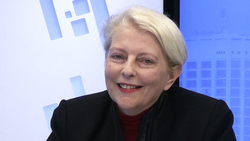
► Full reference: M.-A. Frison-Roche, "Entreprises et compliance : une justice et des juges plus offensifs" ("Companies and compliance: more aggressive courts and judges"), interview conducted by Jean-Philippe Denis as part of a series of interviews on Compliance Law, in Fenêtres ouvertes sur la gestion (Open windows on management), broadcast by J.-Ph. Denis, Xerfi Canal, recorded December 12, 2023, released on June 14, 2024.
____
🌐consult the December 2023 presentation of the interview on LinkedIn
____
🎥watch the interview video on LinkedIn, with English subtitles
____
🧱consult the general presentation of this series of interviews on Compliance Law
____
► Starting point: Since 2016, Marie-Anne Frison-Roche has been building Compliance Law, notably through a collection co-published in French with Editions Dalloz and co-published in English with Editions Bruylant:
🧱read the presentation in English of the series in French, Régulations & Compliance ➡️click HERE
🧱read the presentation of the series in English, Compliance & Regulation ➡️click HERE
____
► Summary of interview:
Jean-Philippe Denis. Question :
Marie-Anne Frison-Roche. Answer. :
____
J.-Ph D. Q. : Thus
MaFR. A. : Yes,
____
J.-Ph. D. Q. : Thus
MaFR. A. : Yes,
________
June 12, 2024
Conferences
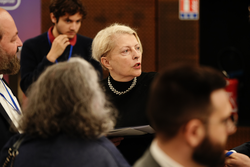
🌐follow Marie-Anne Frison-Roche on LinkedIn
🌐subscribe to the Newsletter MAFR Regulation, Compliance, Law
____
► Full Reference: M.-A. Frison-Roche, Participation in the panel "Une Gouvernance responsable : vers un mieux vivre ensemble ?" ("Responsible governance: towards a better way of living together"), in Grenelle du Droit 5. L'avenir de la filière juridique, Association française des juristes d'entreprise ("The future of the legal profession"), AFJE), Cercle Montesquieu and Paris Panthéon-Sorbonne University, Campus Port-Royal Université Paris 1 Panthéon-Sorbonne, 1 rue de la Glacière, 75013 Paris, June 12, 2024
____
🧮See the full programme of this event (in French)
____
🎥watch the interview made just after this round-table discussion (in French)
____
🪑🪑🪑🪑🪑 will also be taking part in this round-table discussion:
🕴️Yves Garagnon, Chairman of Dilitrust,
🕴️Pierrick Le Goff, lawyer, partner at De Gaulle Fleurance,
🕴️Sabine Lochmann, Chairman of Ascend,
🕴️Vincent Vigneau, President of the Commercial, Economic and Financial Chamber of the Cour de cassation (French Judicial Supreme Court)
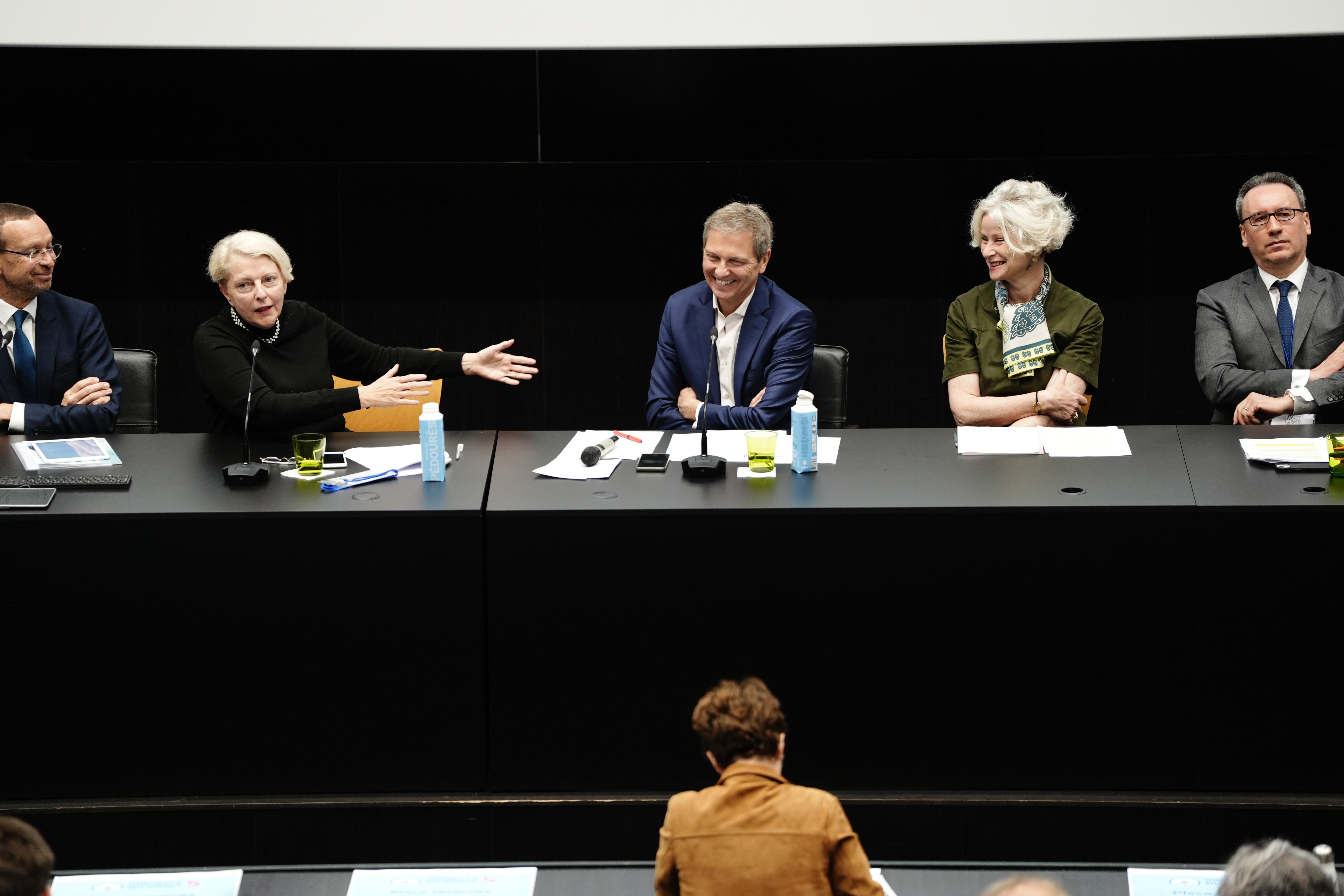
____
► English presentation of my intervention in this event's opening plenary round-table: In this plenary round table which opens the event, devoted to the theme of 'responsible corporate governance', for my interventions based on my work I will have the opportunity to address more particularly these different perspectives:
- How the new Compliance Law, which gives concrete expression to the responsibility of enterprises in a new relationship with States and with civil society, constitutes a 'legal revolution
- 💡for the record, mafr,📝Compliance Law, 2016 ; (ed.) 📘Compliance Monumental Goals, 2022
- how the judgment handed down by the Tribunal judiciaire de Paris (Paris First Instance Civil Court) on 28 February 2023 (Total Ouganda case) is remarkable and already constitutes a turning point in case law
- 💡for the record, mafr, 🎤audition as amica curiae, hearing of 26 October 2022 before the first instance Paris Court; (ed)📘Compliance Jurisdictionalisation, 2024
- how the relationship between States and enterprises is being renewed by this profound legal movement expressed by Compliance Law
- 💡for the record, mafr et M. Boissavy (ed.), 📕Compliance et droits de la défense - Enquêtes internes, CJIP, CRPC, mafr (dir.), 📘 Compliance Obligation, 2025
- how internal lawyers have a decisive and central role to play in this movement, particularly in the mechanism of vigilance / corporate sustainability due diligence, the "cutting edge" of Compliance Law,
- 💡for the record, mafr, 📝Contract of Compliance, Compliance stipulations, 2023 ; (ed.), 📘Compliance and Contract, 2025
- what is meant by the "Ex Ante responsibility" of enterprises, which does not necessarily entail their Ex Post liability, a distinction which lawyers are the guardians of
- 💡for the record, mafr, 📝La responsabilité Ex Ante, pilier du Droit de la Compliance ("Ex-Ante Responsability, Compliance Law Pillar"), 2021
- how European Compliance Law is profoundly humanist, an identity that distinguishes European Compliance from American Compliance and, above all, from Chinese Compliance.
- 💡for the record, mafr (ed.), 📕Pour une Europe de la Compliance ("For the Europe of the Compliance"), 2017
________
read the article about this round table written by Delphine Bauer in Actu-Juridique (in French)
June 11, 2024
Thesaurus : Doctrine
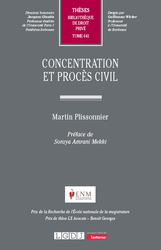
► Référence complète : M. Plissonnier, Concentration et procès civil, préf. S. Amrani Mekki, LGDJ, coll. "Bibliothèque de droit privé", t. 641, 2024, 688 p.
____
📗lire la 4ième de couverture
____
📗lire le sommaire de l'ouvrage
____
📗lire la table des matières de l'ouvrage
____
► lire le résumé de la thèse, publié sur le site de l'ENM
____
► Résumé de l'ouvrage (fait par l'éditeur) : "Le 7 juillet 2006, dans une décision Cesareo restée célèbre, l’Assemblée plénière de la Cour de cassation a décidé qu’il incombait aux parties de « présenter dès l’instance relative à la première demande l’ensemble des moyens […] de nature à fonder celle-ci ».
Souvent décrit comme révolutionnaire, cet arrêt a consacré une forme de contrainte pourtant connue dans le procès civil français et en droit comparé : une concentration des moyens.
Depuis une vingtaine d’années, le type de contrainte procédurale que constitue la concentration est de plus en plus utilisé à la faveur des mouvements de fond qui traversent la procédure civile (crise de la justice, crise du temps). La question se pose dès lors de savoir quel sens donner à la concentration dans le procès, car elle demeure relativement méconnue, et quelle influence elle exerce sur lui.
Partant des différentes concentrations existantes et des utilités qu’elles poursuivent, la thèse tente d’abord de systématiser une notion de concentration en construisant sa définition et la désignant pour ce qu’elle est : un type de charge du procès.
Quant à ses effets sur le procès, la thèse soutient que la concentration joue un rôle qui est excessif, tant sur le rôle des parties et du juge, supposés équilibrés, que sur le déroulement du procès, supposé s’inscrire dans le temps. Pour autant, la concentration n’est pas à bannir. Plusieurs remèdes sont proposés pour adapter ou équilibrer la concentration en vue de parvenir à son usage maîtrisé.".
_________
June 5, 2024
Thesaurus : Doctrine

► Référence complète : H. Kassoul (dir.), Le choix des juges. Les Rencontres de Thémis et Sophia (3e édition), LexisNexis, 2024, 263 p.
____
____
📗lire le sommaire de l'ouvrage
____
📗lire la table des matières de l'ouvrage
____
►Résumé de l'ouvrage (fait par l'éditeur) : "Le thème du "choix des juges" invite à cheminer sur la crête du processus décisionnel, à penser des sujets relatifs tant à la procédure qu’à l’administration de la justice, à explorer le modèle du "bon juge", à peser le "bon" ou le "mauvais" choix, à réfléchir aux limites de l’office du juge, mais aussi, plus largement, à penser le face-à-face entre la justice et la cité.
Se posent ainsi, d’une part, la question du mode de désignation des juges, et, d’autre part, celle du juge au travail. En d’autres termes, il aura fallu se demander "comment choisir les juges ?" et "comment les juges font-ils des choix ?".
Les Rencontres de Thémis et Sophia auront contribué à éclairer ce sujet d’un point de vue juridique et philosophique, en épousant une démarche pluridisciplinaire.".
________
May 30, 2024
Thesaurus : Doctrine
► Référence complète : Th. Douville, "De l'approche extensive de la prise de décision exclusivement automatisée (à propos du refus d'un prêt fondé sur une note de solvabilité communiquée par un tiers)", D. 2024, pp. 1000-1004
____
🦉Cet article est accessible en texte intégral pour les personnes inscrites aux enseignements de la Professeure Marie-Anne Frison-Roche
________
May 29, 2024
Law by Illustrations

► Référence complète : M.-A. Frison-Roche., "La justice au miroir de ses erreurs : Copie conforme", billet mai 2024.
___
En 1947, sort un film Copie conforme qui eut un très grand succès, peut-être parce que Louis Jouvet y endossait tant de rôles.

C'est sous cet angle là qu'enfant on me parlait de ce film. Avant d'avoir fait connaissance avec la procédure juridique du "copie conforme", c'est par ce dédoublement du personnage de guignol qui change parce qu'il met une fausse moustache, ou des lunettes, et devient alors un autre, puis trouve un autre homme qui lui ressemble tant que les deux ne deviennent plus qu'un, que je suis d'abord ce qu'était "Copie conforme".
Plus tard, quand j'eus l'âge de lire des livres, puis des livres de droit, j'appris la procédure du "copie conforme" par laquelle un agent doté de l'autorité publique requise peut délivrer un autre document certifié comme reproduisant exactement un original et pouvant faire foi qu'il ne déforme pas celui-ci dans la copie qu'il en fait.
Quel film qui dit tout l'inverse du Droit, qui le fait mentir.
Qui décrit l'injustice de la justice.
____
Il y a beaucoup de perspectives dans ce film, ce qu'est un film, puisque le personnage central est un photographe célèbre, qui peut transformer tout le monde par les photos qu'il prend, la tête ou les jambes dissociés, photographiant l'inspecteur de police lui disant qu'il ne le fait pas payer "puisqu'il se paye sa tête" en lui déformant le visage lui tordant la bouche ce qui rend ses paroles incompréhensibles.
C'est cela l'art de se découper, de transformer, de mettre en carré, Jouvet habillé en prince opérant cela avec quiconque et avec tous.
Mais enfin, parlons ici plutôt du Droit puisqu'il va cesser de se dupliquer en vieillard, en ouvrir, en duc, en déménageur, tout en restant derrière sa caméra, que lorsqu'il sera confronté à la justice en ayant l'idée qui lui sera fatale : celle de trouver un alibi.
Cet alibi, c'est un personne qui n'existe pas puisqu'il s'appelle Monsieur Dupont, qu'il veut mourir (parce que la justice l'a pris pour un autre, pour un duc, pour un déménageur, etc.), et qu'il faut absolument rester dans sa vie qui lui plait et qu'il décrit avec soin : n'être pas "quelqu'un", n'être pas reconnu, avoir ses amis, sa journée réglée, son chat, la belle vie quoi.
Mais le photographe, qui ne peut donc vivre qu'en volant par son appareil et tous ses accessoires toutes les vies possibles de tous les autres possibles (car la femme parfaite photographiée par la tête de l'une et les jambes de l'autre n'existe pas davantage, le duc non plus, etc.), trouve enfin un homme qui croit ne pas vivre mais qui, de banalité en banalité touche plus le sol, en butant sur le pot-au-lait du matin, en rangeant chaque soir sa chemise. Et ça, il va l'appeler : Duplicata. Comme ils se ressemblent, il lui dit que tant qu'il ira cambrioler, l'autre se montrera et ainsi l'image sera donnée de son absence sur les lieux du crime puisqu'il était présent ailleurs.

La diabolicum probatio est faite : Louis Jouvet pouvait l'apporter, l'on n'en doutait pas de sa part, le Quai des orfèvres est si proche.
____
Pourquoi le pâle reflet devient-il le personnage consistant ? l'on pourrait dire l'inverse car le splendide n'est qu'une image alors que la scène pivot du film est la discussion, toute entière, des deux dans laquelle le personnage qui croit n'être rien, puisqu'il n'est pas connu et n'a pas de prestance, a une vie et c'est par affection que sa collègue fera un faux témoignage pour lui, mais cela il ne le voit pas. Le voleur, celui qui n'a donc en réalité rien à lui, ne dit rien de lui, que pourrait-il dire puisqu'il est que duc, déménageur, vendeur de diamant, livreur, enfin il suffit de passer commande au photographe et d'attirer sa convoitise, expose juste l'exploitation qu'il va faire de l'insignifiant Dupont.
Dupont quant à lui décrit sa vie, refuse qu'on la lui ôte, revendique que sa vie si insignifiante soit-elle c'est la sienne et qu'elle n'est pas à la disposition d'autrui. J'ai pensé à De minimis. Il raconte que la justice déjà a voulu la lui prendre.
En effet, la justice a voulu la plus prendre. Monsieur Dupont est vendeur de boutons. C'est pour en vendre qu'il entre en contact avec une victime du voleur. Il en vend peu parce qu'il ne sait pas très bien vendre. On a du charisme ou on n'en a pas.
Immédiatement reconnu, il est déféré au tribunal. Le juge le confronte à toutes les victimes.
Formellement les victimes le reconnaissent, formellement les victimes ne le reconnaissent pas. On lui met des lunettes, ou des moustaches, ou des cheveux gris : les victimes commencent à se disputer entre elles.... Mais si c'est absolument ! Mais non ce n'est absolument pas lui !
Et là, sa jeune collègue le sauve de la prison dans laquelle le juge veut l'envoyer en intervenant et en faisant un faux témoignage, affirmant que le jour du délit, ils étaient ensemble, que d'ailleurs ils sont ensemble... Et c'est ainsi qu'il échappe à la prison.

Par la suite, lorsque l'insignifiant, celui qui vit et qui est aimé, rencontre celui qui a de la prestance, c'est-à-dire celui qui est vide et n'a rien, le premier voudra la vie de l'autre. C'est si beau la grande vie, et Louis Jouvet porte si beau la queue-de-pie.
N'est-ce pas un merveilleux film, Copie conforme ?
________

May 27, 2024
Organization of scientific events

► Full Reference: Les contrôles techniques des risques présents sur les plateformes et les contentieux engendrés (Technical risks controls on platforms and disputes arising from them), in cycle of conference-debates "Contentieux Systémique Émergent" ("Emerging Systemic Litigation"), organised on the initiative of the Cour d'appel de Paris (Paris Cour of Appeal), with the Cour de cassation (French Court of cassation), the Cour d'appel de Versailles (Versailles Court of Appeal), the École nationale de la magistrature - ENM (French National School for the Judiciary) and the École de formation des barreaux du ressort de la Cour d'appel de Paris - EFB (Paris Bar School), under the scientific direction of Marie-Anne Frison-Roche, May 27, 2024, 9h-10h30, Cour d'appel de Paris, Cassin courtroom
____
🧮see the full programme of the cycle Contentieux Systémique Émergent (Emerging Systemic Litigation)
____
🌐see on LinkedIn the report of this event
____
🧱read below the report of this event⤵️
____
► Presentation of the conference: The digital space is full of risks. Some are naturally associated with it, because it is an area of freedom, while others must be countered because they are associated with generally prohibited behaviour, such as money laundering. But the digital space has developed risks which, because of their scale, have been transformed in their very nature: this is particularly true of the distortion permeating certain content and the insecurity that can threaten the entire system itself. Law has therefore entrusted operators themselves with vigilance over what have become ‘cyber-risks’, such as the risk of disinformation, the risk of destruction of communication infrastructures, and the risk of data theft, a systemic prospect that can lead to the collapse of societies themselves.
New legislations has been drafted, in particular the Digital Services Act (DSA), to increase the burdens and powers of firms in this area, with digital companies in the front line, but also supervisory authorities such as the Autorité de régulation de la communication audiovisuelle et numérique - Arcom (French Regulatory Authority for Audiovisual and Digital Communication). The resulting disputes, in which firms and regulators may be allies or opponents, are systemic in nature.
The judge's handling of these "systemic cases", through the procedure and the solutions, must respond to this systemic dimension. The "pornographic websites" case, which is currently unfolding, provides an opportunity to observe in vivo the dialogue between judges when a "systemic case" imposes itself on them.
____
🧮Programme of this event:
Third conference-debate
LES CONTRÔLES TECHNIQUES DES RISQUES PRÉSENTS SUR LES PLATEFORMES ET LES CONTENTIEUX ENGENDRÉS
(TECHNICAL RISKS CONTROLS ON PLATFORMS AND DISPUTES ARISING FROM THEM)
Paris Court of Appeal, Cassin courtroom
Moderated by 🕴️Marie-Anne Frison-Roche, Professor of Regulatory and Compliance Law, Director of the Journal of Regulation & Compliance (JoRC)
🕰️9h-9h10. 🎤Le contentieux Systémique Emergent du fait du système numériqué (Systemic Litigation Emerging from the Digital System), 🕴️Marie-Anne Frison-Roche
🕰️9h10-9h30. 🎤Les techniques de gestion du risque systémique pesant sur la cybersécurité des plateformes (The Systemic Obligation of Security on Platforms and associated Litigation), 🕴️Michel Séjean, Professor of Law at Sorbonne Paris Nord University
🕰️9h30-9h50. 🎤Un cas systémique in vivo : le cas dit des sites pornographiques (An in vivo Systemic Case: the so-called case of pornographic websites),🕴️Marie-Anne Frison-Roche
🕰️9h50-10h10. 🎤Les obligations systémiques des opérateurs numériques à travers le Règlement sur les Services Numériques (RSN/DSA) et le rôle des régulateurs (Systemic Obligations of Operators (DSA) and the role of Regulators), 🕴️Roch-Olivier Maistre, Chair of the Autorité de régulation de la communication audiovisuelle et numérique - Arcom (French Regulatory Authority for Audiovisual and Digital Communication)
🕰️10h10-10h30. Debate
____
🔴Registrations and information requests can be sent to: inscriptionscse@gmail.com
🔴For the attorneys, registrations have to be sent to the following address: https://evenium.events/cycle-de-conferences-contentieux-systemique-emergent/
⚠️The conference-debates are held in person only, in the Cour d’appel de Paris (Paris Court of Appeal).
____
🧱read below a detailed presentation of this event⤵️
________
April 27, 2024
Interviews
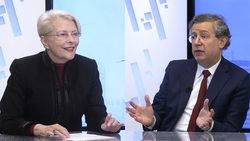
► Full reference: E. Silva-Romero, "Droit de la Compliance : Arbitrage International et géopolitique" ("Compliance Law: International Arbitration and Geopolitics"), interview conducted by M.-A. Frison-Roche as part of a series of interviews on Compliance Law, in Fenêtres ouvertes sur la gestion (Open windows on management), broadcast by J.-Ph. Denis, Xerfi Canal, recorded December 12, 2023, recorded April 27, 2024
____
🌐consult the presentation of Eduardo Silva-Romero's interview on LinkedIn
____
🎥view the full interview on Xerfi Canal
____
► Starting point: In 2023, Eduardo Silva-Romero wrote a contribution:📝What place is there for compliance in investment arbitration?, in the book 📘Compliance Jurisdictionalisation
🧱read the presentation of this contribution ➡️click HERE
____
► Summary of interview:
Marie-Anne Frison-Roche. Question: What is the place of Compliance in international investment arbitration and, first of all, what is its specificity?
Edouardo Silva-Romero. Answer: International investment arbitration is based on a treaty, generally signed between two States, which agree to protect the investments that companies make in the host State. The resulting disputes may give rise to this specific type of arbitration.
Compliance has a special place here, because if the investment is tainted by corruption or fails to respect human rights, it will not be protected by the arbitrators, as the host state is no longer bound.
____
MaFR. Q.: So, through Compliance, states can assert their sovereignty?
E.S-R. A.: Yes, through the social dimension of Compliance, States can assert their social conception and impose it in investment arbitration.
____
MaFR. Q.: Is the attractiveness of the Paris marketplace enhanced?
E.S-R. A.: The International Court of Arbitration is headquartered in Paris, and it's clear that this presence, combined with Compliance's humanistic approach to investment arbitration, is an essential element of attractiveness. Because of the technicalities involved, it is essential for international arbitrators to master compliance law in order to participate in this new element of attractiveness, as it takes the form of rules of public order, and this is also how the Paris Court of Appeal exercises its control over awards.
________

April 26, 2024
Organization of scientific events
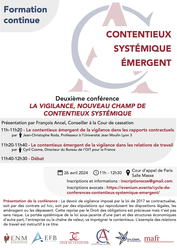
► Full Reference: La vigilance, nouveau champ de contentieux systémique (Vigilance, new field of Systemic Ligation), in cycle of conference-debates "Contentieux Systémique Émergent" ("Emerging Systemic Litigation"), organised on the initiative of the Cour d'appel de Paris (Paris Cour of Appeal), with the Cour de cassation (French Court of cassation), the Cour d'appel de Versailles (Versailles Court of Appeal), the École nationale de la magistrature - ENM (French National School for the Judiciary) and the École de formation des barreaux du ressort de la Cour d'appel de Paris - EFB (Paris Bar School), under the scientific direction of Marie-Anne Frison-Roche, 26 April 2024, 11am.-12.30am., Cour d'appel de Paris, Massé courtroom
____
🧮see the full programme of the cycle Contentieux Systémique Émergent (Emerging Systemic Litigation)
____
🌐see on LinkedIn the report of this event
____
🧱read below the report of this event⤵️
____
► Presentation of the conference: The duty of vigilance imposed by the 2017 French law is being contractualised, either by ad hoc contracts or by stipulations that reproduce the legal provisions, adjust them or go beyond them. This adoption by the Contract and Tort Law is valuable but not without risk. The systemic scope of the underlying law on the one hand and of economic structures on the other, the firm or the value chain, will permeate litigation. The example of labour relations is instructive in this respect.
____
🧮Programme of this event:
Second conference-debate
LA VIGILANCE, NOUVEAU CHAMP DE CONTENTIEUX SYSTÉMIQUE
(VIGILANCE, NEW FIELD OF SYSTEMIC LITIGATION)
Paris Court of Appeal, Massé courtroom
General presentation of the topic and moderation by 🕴️François Ancel, Judge at the Première Chambre civile de la Cour de cassation (First Civil Chamber of the French Court of cassation)
🕰️11am.-11.20am. 🎤Le contentieux émergent de la Vigilance dans les rapports contractuels (Emerging Vigilance Litigation in Contractual Relationships), by 🕴️Jean-Christophe Roda, Full Professor at Jean-Moulin Lyon 3 University
🕰️11.20am.-11.40am. 🎤Le contentieux émergent de la Vigilance dans les relations de travail (Emerging Vigilance Litigation in Employment Relationships), by 🕴️Cyril Cosme, Director of the French Office of the International Labour Organization (ILO)
🕰️11.40am.-12.30am. Debate
____
🔴Registrations and information requests can be sent to: inscriptionscse@gmail.com
🔴For the attorneys, registrations have to be sent to the following address: https://evenium.events/cycle-de-conferences-contentieux-systemique-emergent/
⚠️The conference-debates are held in person only, in the Cour d’appel de Paris (Paris Court of Appeal).
____
🧱read below a detailed presentation of this event⤵️
________
April 9, 2024
Thesaurus : 05.1. CEDH
► Référence complète : CEDH, Grande chambre, 9 avril 2024, n°53600/20, Verein Klimaseniorinnen Schweiz et a. c/ Suisse
____
________
April 8, 2024
Hearings by a Committee or Public organisation
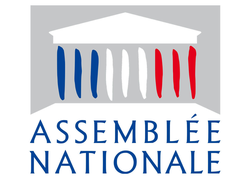
🌐 follow Marie-Anne Frison-Roche on LinkedIn
🌐subscribe to the Newsletter MAFR Regulation, Compliance, Law
🌐subscribe to the Video Newsletter MAFR Surplomb
____
► Full reference: M.-A. Frison-Roche, Audition by the French National Assembly's Law Commission on the confidentiality of legal advice (the "Legal Privilege à la française"), 8 April 2024.
____
I had expressed my opinion on the need for French legal system to better ensure the confidentiality of legal opinions drawn up by internal lawyers in companies, in an article published in 2023 in the French academic journal Recueil Dalloz: "La compliance, socle de la confidentialité nécessaire des avis juridiques élaborés en entreprise (Compliance Law, the cornerstone of the necessary confidentiality of legal opinions drawn up by companies". Compliance, the cornerstone of the necessary confidentiality of legal opinions drawn up by companies).
Following on from this article, and as a specialist in Regulatory and Compliance Law, I was invited by the French National Assembly's Law Commission to give my opinion on the proposed law n°2022 on the confidentiality of consultations by in-house lawyers ( Proposition de loi n°2022 relative à la confidentialité des consultations des juristes d'entreprises), often named in French Legal privilege à la française.
____
► Summary of this presentation: I have shown that we must start not from the person (external lawyer / in-house lawyer, for instance) and not even centrally from the information in question (branch of Law by branch of Law), but from the Goals pursued, i.e. from Compliance Law.
In this respect, we must not be misled. We could do so by confusing mechanical "conformity" with this new branch of Law: Compliance Law. Conformity is merely a tool of Compliance Law. Out of concern for the correct use of the French language, as "Compliance" appears to many to be an American term, the proposed law uses the term "conformité" but refers to Compliance Law. Conformity" is merely the mechanical obligation to obey the applicable rules, which is the fate of any subject of law, subject to the mandatory rules, a passive position common to everyone in a State governed by the Rule of Law.
Compliance Law is quite different, with conformity being just one of its tools. On the one hand, Compliance Law imposes an active obligation, and on the other, it targets only certain legal subjects: companies. For them, it is a matter of ensuring that certain goals set by the legislator are actually achieved, which becomes effectively and efficiently possible thanks to the power of companies (financial power, organizational power, management power, information power, location power, information power). These "Monumental Goals" are either negative (preventing systems from collapsing) or positive (ensuring that systems improve).
For companies to play this role - a role that is not required of other "ordinary" people, as they are not "in a position" to take on such a burden, particularly in terms of finance and organization - those in charge of organizing themselves and taking action, i.e. companies, must "detect and prevent" system failures (as required by laws such as US FCPA, French so-called Sapin 2 and Vigilance laws, European CSRD and CS3D, etc.). To "detect and prevent", which is an order from the Legislator, companies need to know the weaknesses of their organization and of the people they answer to, in order to remedy them: "remediation" is a "remedy" to ensure the "sustainability" of "systems".
This set of key concepts lies at the heart of Compliance Law, the branch of law That focuses on the future.
It is the legal opinions, for example, and in particular the report resulting from internal investigations, that enable those who decide and control this organization (the managers) to fulfill the role entrusted to them by the State. If these opinions are not confidential, the result is not the remediation and preservation of global systems (competitive, climatic, digital, energy, banking, financial systems, etc.): the effective managerial solution in Ex-Ante then consists not in seeking information but, conversely, in not seeking this information, since obtaining it will lead to the weakening of the company through the sanction that the information produces, for lack of confidentiality.
The interests of the system, the State and the company are disjointed, because Compliance Law implies their alliance, which is what the confidentiality of legal opinions produces.
This is why Compliance Law must, by its very nature, ensure the confidentiality of legal advice.
____
When asked about the actual text of the proposal, I felt that the explanatory memorandum was particularly relevant, since the link between Compliance Law (admittedly called "conformité" in the proposed bill by a rather too mechanical respect for the French legal language, from which the French legislator has so far been unable to dispense....) is clear, that this confidentiality is attached to the document, that the company can waive it, and that it is clearly distinct from professional secrecy, all three of which should be approved.
For my part, I've suggested a change to the procedure, which must be open to the confidentiality process.
Indeed, public authorities, such as Competition and Regulatory Authorities, are rather hostile to this confidentiality.
Having contributed a great deal to the development of Regulatory Law, and continuing to do so, I believe that Competition and Regulatory Authorities have a logic that needs to be understood. It is as follows: Regulatory Authorities are Ex-Ante (this was less true for the Competition Authorities, but it too is increasingly so) and are in a situation of information asymmetry. Their first concern is to combat this asymmetry. If we translate this into legal terms, it means that in order to carry out their mission of general interest, they must seek out all available information. However, legal opinions, and in particular the internal investigation report, are what I have described as "evidence treasure". In their logic, the Competition and Regulatory Authorities want to seize it.
There is therefore a conflict between two general interest logics: the general interest of the Monumental Goals of Compliance Law actively served by companies, at the behest of the Legislation, which requires the confidentiality of legal opinions, and the general interest of the action of Regulators who fight against information asymmetry and seek to seize the evidential treasures of legal opinions.
For the reasons given above, I believe that the Monumental Goals of Compliance must prevail. All the more so as the rights of the defence converge to this end.
Ultimately, however, it is up to the Judge, in the event of open conflict, to balance these two claims, which are based on the service of the general interest.
However, reading the proposition, it seems to me that the rather complicated procedure entrusts this to a multiplicity of judges... But since it is indeed Compliance Law which is the best basis for "legal privilege à la française", Compliance Law, which is the extension of Regulatory Law and whose advanced point is the Vigilance duty, it would be more appropriate and logical to entrust this litigation to the exclusive jurisdiction of the Paris Judicial Court. This court has already the exclusive competence for litigation about Vigilance.
This would have another fortunate effect: on appeal, the dispute would be brought before the Paris Court of Appeal, which has exclusive jurisdiction (barring exceptions) over disputes concerning decisions on French Competition and Regulatory Authorities. The judges of the "Pôle 5" (12 chambers specializing in economic law) of the very specific court are seasoned and would be well-suited to strike the necessary balance between the two general interests involved.
I think a procedural amendment to the proposed text along these lines would be welcome.
____
► See in my work those that may be of interest with regard to this hearing (all with English summary, many with bilingual working paper) ⤵️
🕴️M.-A. Frison-Roche, 📝Le rôle du juge dans le déploiement du Droit de la Régulation par le Droit de la Compliance, in 📗Conseil d'État et Cour de cassation, De la Régulation à la Compliance : quel rôle pour le Juge ?, 2024.
🕴️M.-A. Frison-Roche, 📝Compliance et conformité : les distinguer pour mieux les articuler, 2024.
🕴️M.-A. Frison-Roche (dir.),📕L'obligation de compliance, 2024.
🕴️M.-A. Frison-Roche et M. Boissavy (dir.), 📕Compliance et droits de la défense, 2024.
🕴️M.-A. Frison-Roche (dir.), 📕Compliance et droits de la défense, Les Buts Monumentaux de la compliance, 2022.
🕴️M.-A. Frison-Roche, 📝Contrat de compliance, clauses de compliance, 2022.
🕴️M.-A. Frison-Roche, 📝Le Droit de la compliance, 2016.
________
April 4, 2024
Thesaurus : Doctrine
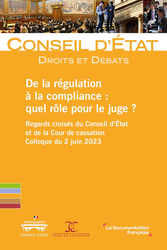
► Full Reference: Conseil d'État (French Administrative Supreme Court) & Cour de cassation (French Judiciary Supreme Court), De la régulation à la compliance : quel rôle pour le juge ? Regards croisés du Conseil d'Etat et de la Cour de cassation, ("From Regulatory Law to Compliance Law: what role for the Judge?"), La Documentation française, coll. "Droits et Débats", 2024, 241 p.
____
📗read the coverback (in French)
____
📗read the table of content (in French)
____
► Summary of this book : "Compliance, sometimes translated in French by the word "conformité" ("conformity"), is an extension of Regulatory Law and represents from it a new and decisive step forward.
Compliance brings together all the mechanisms implemented within an organisation to achieve general interest goals (security, sustainability), thereby countering systemic risks. By relying on the rules, legal and ethical standards that embody these values, which are imposed on them and internalised by them, enterprises can both prevent the risk of sanctions and participate in this alliance between public authorities, economic operators and stakeholders to detect and prevent future systemic disasters.
Organisé par le Conseil d’État et la Cour de cassation, le colloque du 2 juin 2023 analyse ce changement de paradigme créé par cette nouvelle branche du droit.".
Organised by the Conseil d'État (French Administrative Supreme Court) and the Cour de cassation (French Judiciary Supreme Court), the conference on 2 June 2023, basis of this book, has analysed this paradigm shift created by this new branch of law: Compliance Law.
____
📝read the presentation in English of the concluding contribution of Marie-Anne Frison-Roche : "Le rôle du juge dans le déploiement du droit de la régulation par le droit de la compliance"
___
📝read the presentation in English of the contribution of François Ancel : "Quel rôle pour le juge aujourd’hui dans la compliance ? Quel office processuel du juge dans la compliance ?"
________
April 4, 2024
Thesaurus : Doctrine

► Référence complète : F. Ancel, "Quel rôle pour le juge aujourd’hui dans la compliance ? Quel office processuel du juge dans la compliance ?", in Conseil d'État et Cour de cassation, De la régulation à la compliance : quel rôle pour le juge ? Regards croisés du Conseil d'Etat et de la Cour de cassation - Colloque du 2 juin 2023, La Documentation française, coll. "Droits et Débats", 2024, pp. 101-119
____
► Résumé de l'article :
________
April 4, 2024
Publications

🌐follow Marie-Anne Frison-Roche on LinkedIn
🌐subscribe to the Newsletter MAFR Regulation, Compliance, Law
____
► Full Reference: M.-A. Frison-Roche, "Le rôle du juge dans le déploiement du droit de la régulation par le droit de la compliance" ("Synthesis: The role of the Judge in the deployment of Regulatory Law through Compliance Law"), Synthesis in Conseil d'État (French Council of State) and Cour de cassation (French Court of cassation), De la régulation à la compliance : quel rôle pour le juge ? Regards croisés du Conseil d'Etat et de la Cour de cassation - Colloque du 2 juin 2023, La Documentation française, "Droits et Débats" Serie, 2024, pp. 173-182
____
____
🚧read the bilingual Working Paper which is the basis of this article, with additional developments, technical references and hyperlinks
____
► Presentation of this concluding article: It is remarkable to note the unity of conception and practice between professionals who tend to work in administrative jurisdictions and professionals who tend to work in judicial jurisdictions: they all note, in similar terms, an essential movement: what Regulatory Law is, how it has been transformed into Compliance Law, and how in one and even more so in the other the Judge is at the centre of it.
Judges, as well as Regulators and European officials, explain this and use different examples to illustrate the far-reaching changes it brings to the Law and to the companies responsible for increasing the systemic effectiveness of the rules through the practice and dissemination of a Culture of Compliance.
The role of the judge participating in this Ex Ante transformation is renewed, whether he/she is a judge of Public Law or a judge of Private Law, in a greater unity of the legal system.
____
► English Summary of this article: The tug-of-war between 'Compliance' and 'conformity', which is exhausting us, obscures what is essential, i.e. the great novelty of a branch of law that assumes a humanist vision expressing the ambition to shape the future so that it is not catastrophic (preventing systems from collapsing), or even better (protecting human beings in these systems).
The article begins by describing the emergence of Compliance Law, as an extension of Regulatory Law and going beyond it. This new branch of law takes account of our new world, brings its benefits and seeks to counter these systemic dangers so that human beings could be their beneficiaries and are not crushed by them. This branch of Ex Ante Law is therefore political, often supported by public Authorities, such as Regulatory Authorities, but today it goes beyond sectors, as shown by its cutting edge, the Obligation of Vigilance.
The "Monumental Goals" in which Compliance Law is normatively anchored imply a teleological interpretation, leading to an "empowerment" of the crucial operators, not only States but also companies, responsible for the effectiveness of the many new Compliance Tools.
The article goes on to show that Judges are increasingly central to Compliance Law. Lawsuits are designed to make companies more accountable. In this transformation, the role of the judge is also to remain the guardian of the Rule of Law, both in the protection of the rights of the defence and in the protection of secrets. Efficiency is not what defines Compliance, which should not be reduced to a pure and simple method of efficiency, which would lead to being an instrument of dictatorship. This is why the principle of Proportionality is essential in the judge's review of the requirements arising from this so powerful branch of Law.
The courts are thus faced with a new type of dispute, of a systemic nature, in their own area, which must not be distorted: the Area of Justice.
____
📝read article (in French)
________